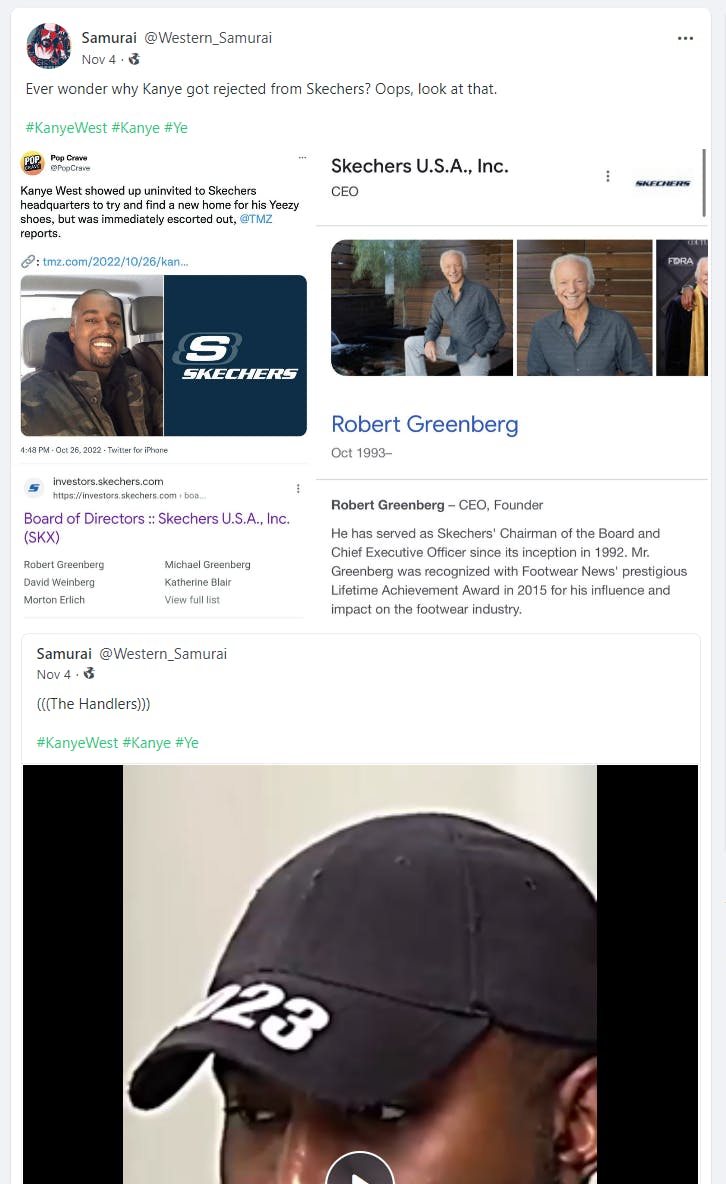A New Threat to Corporate Executives

By Alethea Team
Asa Berolzheimer, Brian Potochney, Chris Tebsherany & Suria Vanrajah
Over the last several months, Alethea conducted investigations into online conversations about Ye (formerly known as Kanye West) to understand the business implications of disinformation, information manipulation, and fringe social media activity. We analyzed how activity within extremist and conspiratorial communities, including antisemitic and racist tropes, can pose novel risks to businesses. One of the key risks identified were threats to the physical safety of C-Suite and high-profile employees of companies that had previous relationships with Ye. In recent years, executive protection for high-profile individuals, particularly at companies with large profiles or geopolitical influence, has become a key component of corporate strategy and budgeting. Proactively monitoring for narratives about executives can reduce a company’s risk exposure and help prevent real-world incidents stemming from communities known for violent, racist, and antisemitic content.
In the case of Ye, much of the threatening activity and mentions of brands and executives appeared on smaller social media platforms that lack trust and safety teams who actively monitor for threats. This is indicative of the online ecosystem in our current digital reality: bad actors are increasingly using alternative forms of social media to organize and coordinate freely while skirting the content moderation and regulation policies found on mainstream social media platforms.
In the wake of his offensive comments and actions, many of Ye’s corporate affiliates cut ties and ended their professional relationship with him. Within the ensuing conversations about companies’ responses to Ye’s statements, we observed conspiracies about Jewish control [of what], calls for boycotts, and other threats from online users that were broadly based on antisemitic tropes - specifically targeting executives and high-profile employees. It’s important to understand the explicit nature in which companies and their C-suite level employees were being targeted. Users amplified antisemitic conspiracy theories that explicitly called out brands like Adidas, Balenciaga, Nike, Spotify, and JPMorgan, among others. We observed users on Gab, a platform known for hosting right-wing extremist content, identifying Jewish board members of Skechers and using antisemitic symbolism to imply support for Ye’s conspiracy theories.[1]

Gab post including screenshots showing the names of Skechers board members
From a crisis management perspective, companies should be concerned that their brand and employees are being mentioned in communities that have contributed to offline violent actions in the past, presenting businesses with distinct physical security risks that must be taken seriously.[2] Businesses have to be aware of the physical safety risks to their high-profile employees and understand that they are often the targets of offline action that stems from online activity. Proactive monitoring and insights into concerning activity originating on alternative and fringe platforms can be the reason your company avoids a potentially dangerous situation for an employee or identifies a well-executed boycott campaign before it's too late.
So what does this mean for executive monitoring and protection? If you are using a social listening tool simply to monitor Twitter for negative or concerning mentions of your brand and its high-profile employees, you are going to miss the real threats. With Alethea, you get insights into the conversations that allow brands and companies to get out in front of narratives or potentially threatening activity – those that are happening outside of Twitter and traditional media. We specialize in understanding niche platforms, online communities, conspiracy theorists and their motives, forums, blogs, and non-traditional news sources. Having early insights into these ecosystems can help identify risks and enables Alethea to support our customers in determining the narrative origin, risk level, and proactive steps to mitigate a crisis before it starts. When it comes to physical safety, mitigation efforts can include coordinating with the appropriate law enforcement agencies, taking legal action, or liaising with social media platforms in the case of content that violates terms of service.
To learn more about our investigation into Ye and the other kinds of business threats stemming from information manipulation, false narratives, and conspiracy communities, check out the full Ye case study here. To get in touch with our team to learn more about our offerings related to executive monitoring and protection, as well as protecting against general disinformation and social media manipulation, please reach out here.
Footnotes:
[1] https://gab.com/Yeern_Samurai/posts/109285604029008326
[2] https://abcnews.go.com/US/experts-echo-chambers-apps-parler-gab-contributed-attack/story?id=75141014